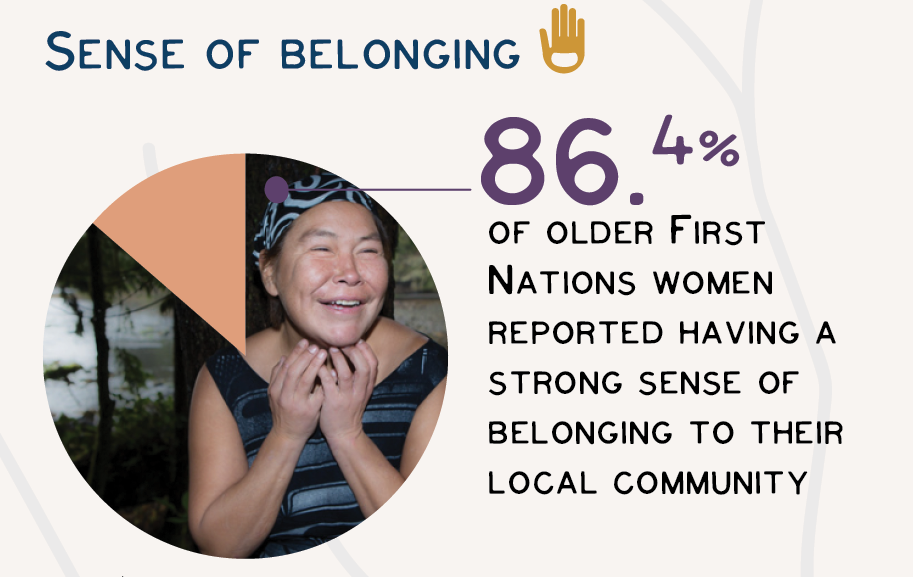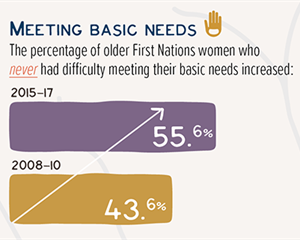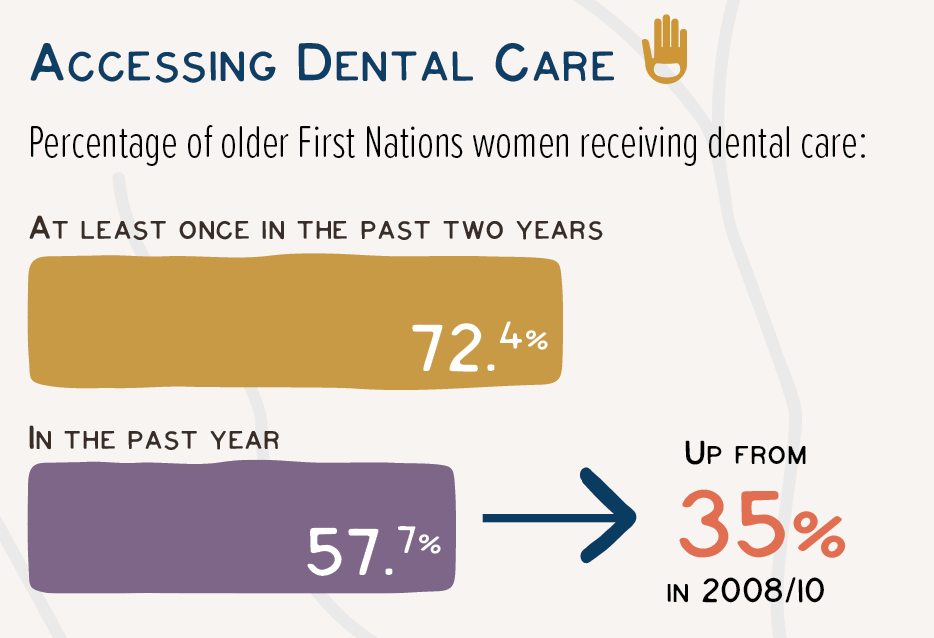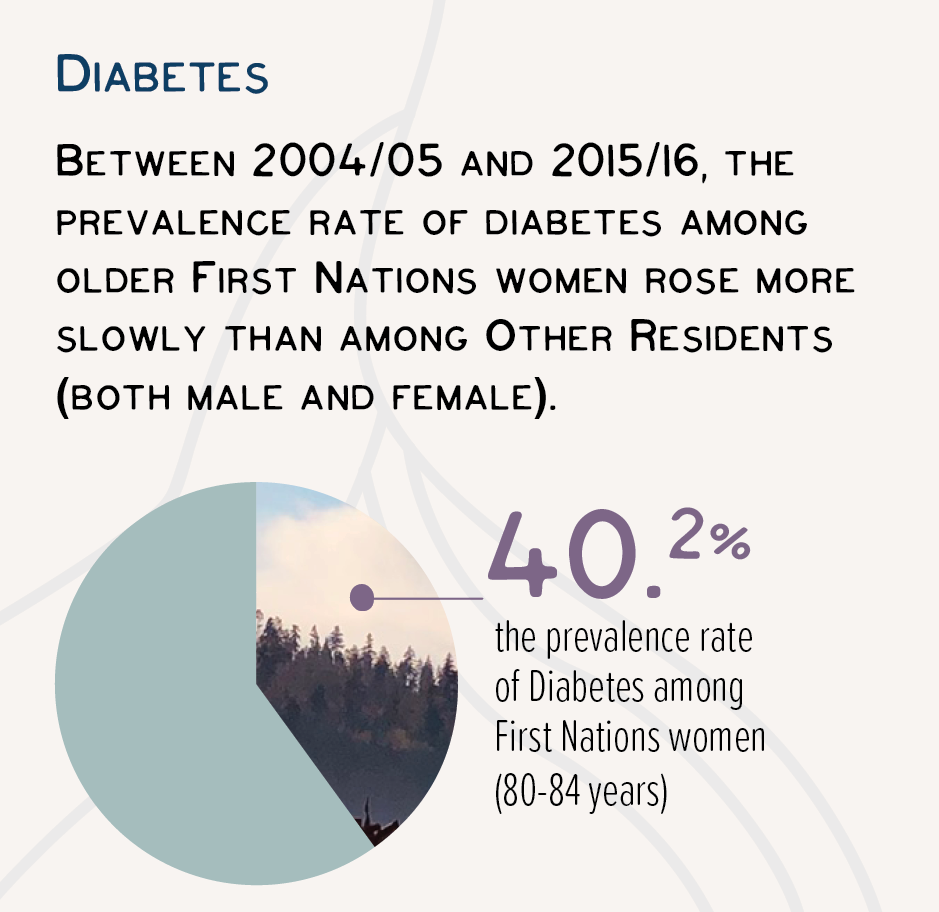Introduction
As grandmothers, mothers and aunties, older First Nations women and Elders who are women are the trusted supports for younger generations of First Nations women and are essential sources of wisdom and advice about healthy ways of living.

Elders are the foundation of First Nations families and communities – and having healthy Elders is crucial to the health and healing of First Nations communities more broadly.
Gratefully, many older First Nations women and Elders living in BC are thriving and healthy. However, this generation has also been most directly affected by some of the most egregious experiences of colonialism such as residential schools, the Sixties Scoop, the reservation system and Indian hospitals.
Many older women have found themselves, as a result, on healing journeys associated with traumatic and difficult pasts. Download a pdf of this chapter.
“We value and treasure them as the ones who provide the link to the past, to the traditions, to wisdom that guides us in how to deal with contemporary issues of living, including now." – Marianne Ignace, Skeetchestn First Nation
Roots of Wellness
Connections to culture and the ancestors, language and ceremony • Connections to land • Connections to community
First Nations have always understood health and wellness as being grounded in a person's connections – their connections to language, the land, the culture, ceremony and the ancestors – and supported through their caring relationships with family, community and the environment.

When strong, these connections provide a core of support and strength to Elders as they age through the final years of life – and prepare to transition from this world.
This grounding is also vital to an Elder's role in teaching, guiding and nurturing the roots of her children and grandchildren and community.
“Today we continue to teach the language, right from preschool to Grade 12 and we're so fortunate to be able to do that.
Like I said, you know, my great grandchildren can speak the language a lot easier than I can. They just learn it so quickly. And they're not afraid to get out there and dance or get up there with a drum or the clappers. They feel so good about it. It's really something to see. You know when we were so ashamed of it.
I remember being young – eight years old or seven, walking to school, Mom would put braids in my hair and before I got to school, I would have the braids out. It was shameful because of all the stigma about who we were." – Elder Virginia Peters (Siyamex), Sts'ailes First Nation
Promising Practice
Indigenous Plant Healing (on YouTube) is a short video in which Elders Barb Whyte (K'ómoks First Nation) and June Johnson (Um'agalis, We wai kai Nation) share their knowledge about the gathering and use of First Nations medicines.
Supportive Systems
The ongoing legacies of colonialism – racism and discrimination, elder abuse • Systems – education, economic, food, health, and access to the internet
As it is at every age, women's health is shaped by having self-determination in relation to roots of wellness. It is also impacted in important ways by the social systems that determine her everyday living conditions, safety and security.

The systems and protocols that BC First Nations have developed over generations to support their communities – systems for learning, housing, food, healing and justice – all suffered erosion from colonialism and continue to be impacted through structural racism. Important progress has been made in recent years to revive and reassert First Nations control of these various social determinants of health, but many older adults have complex, difficult and traumatic relationships with these systems stemming from generations of mistreatment, marginalization and abuse.
“I never saw an Aboriginal teacher when I was growing up. I had no idea it was possible and, in fact, I was told it was not possible.
I began the program and during my first extended practicum I realized I was a teacher. Now I'm living and teaching on my own territory and I'm a role model for Aboriginal youth.
I'm grateful that things happened the way they did. Teaching is definitely a calling that I wasn't even aware of. It was just a title…I guess the residential school did its number. I'm a second generation survivor.
Because I am Aboriginal, because I have different conditions – I am trans, so, my cards were very limited. I had no clue how I was going to become who I am now. And I had no clue that I had the right to dream.
All I wanted to do was live and survive, but this whole journey has made things accessible to me. I have come to terms with myself, my identity. I have stood up as a citizen who has a right to belong and owned my own destiny." – Saylesh Wesley, Stó:lõ/Ts'msyan, completing her PhD in Simon Fraser University's Gender, Sexuality and Women's Studies Department and teaching Indigenous education and learning support in a middle school in Chilliwack
Promising Practice
The Native Women's Association of Canada's Grandmother Spirit Project was undertaken to raise awareness about issues of senior abuse, safety and well-being for senior Aboriginal women in Canada.
The project gathered Indigenous grandmothers from Nations across Canada to share what they knew or were taught about the care of seniors and grandmothers, what they felt impacted safety and well-being (including issues of senior abuse), what was happening or already existing in their communities that helped to address issues of safety and well-being, and what they felt was needed – their visions for moving forward.
The project also partnered with the Native Youth Sexual Health Network to gather youth responses to the issue of keeping their Elders safe. The project has resulted in a video, series of posters and resource booklet.
Healthy Bodies, Minds and Spirits
Physical activity • Eating nutritious meals • Respecting tobacco • Preventing and managing chronic conditions • Heart health • Diabetes • Cancer • Sexual health • Mental wellness and nurturing the spirit • Life stress and depression • Alcohol and substance use • Gambling • Getting help • Suicide
Healthy and supported older First Nations women and Elders are central to achieving the vision of healthy, vibrant and self-determining First Nations women and communities both today and into the future.

First Nations women Elders and matriarchs play a vital role in connecting the First Nations people to one another, connecting them to the culture, the land and the ancestors. They are pivotal in solidifying the roots of wellness; however, in order to fulfill this sacred role, Elders need to be well themselves and communities need to support them in their wellness.
“I remember my mom near the end and she had many effects from diabetes that when the specialist told my mom and told me that my mom couldn't eat the salmon anymore and had to really restrict her diet I remember my mom really breaking down and crying – and she rarely cried.
I said, 'Maybe we could just not eat salmon all the time. Maybe we could just have a little bit of salmon.' And I think that really helped her a lot.
Because our food – and our traditional foods are just like medicine for us. And when we eat it, it is the whole comfort, it's the whole spiritual connection that we have. So that's what we did. We didn't eat salmon all the time, but we ate a little bit of it." – Elder Roberta Price, Coast Salish, Snuneymuxw/Cowichan Tribes
Promising Practice
The Indigenous Cancer Strategy, developed in collaboration between BC Cancer, First Nations Health Authority, Métis Nation British Columbia, and BC Association of Aboriginal Friendship Centres, provides a road map to improve the cancer journeys of Indigenous peoples in BC.
The strategy touches on the key components of knowledge development and partnerships, screening, end-of-life, prevention, cultural safety and survivorship.
